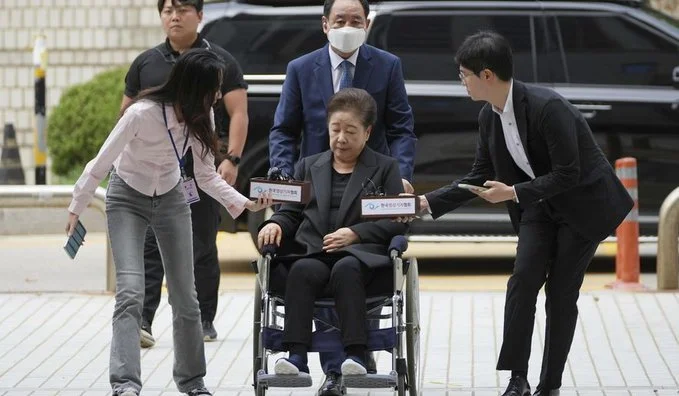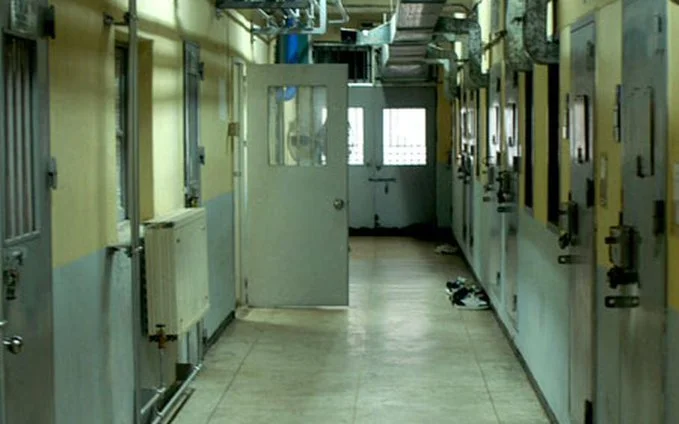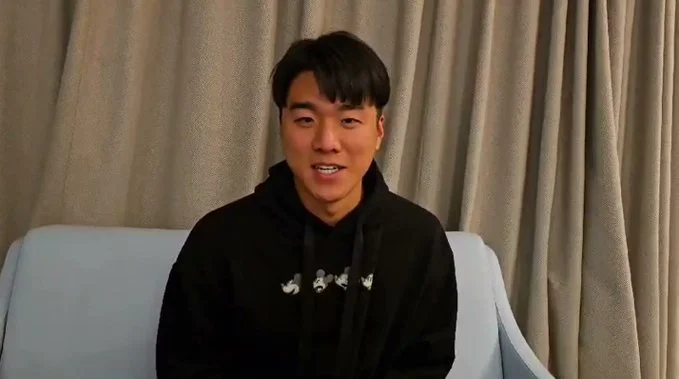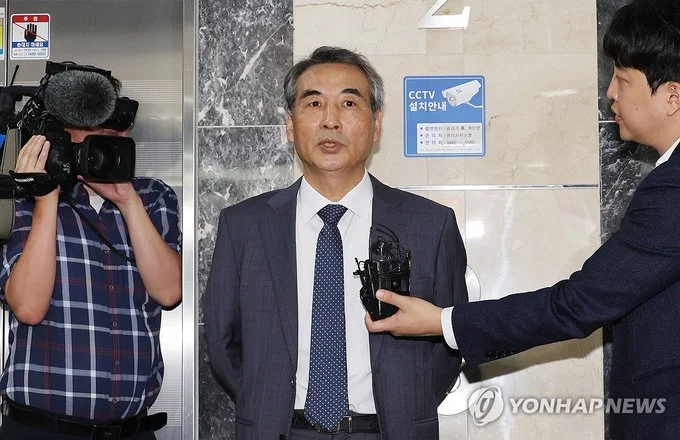THE DAMAGE IS DONE? How Dr. Hak Ja Han’s Detention Can Cause Irreversible Harm
by Rev. Demian Dunkley
This Is Not Just Detention. It’s Physical Decline in Real Time.
Dr. Hak Ja Han, the 82-year-old global peace leader known as the “Mother of Peace,” has now been held in what amounts to solitary confinement for over 40 days in the Seoul Detention Center. But this is not just a legal case, and it is not just religious persecution, it is a humanitarian and medical emergency. Can any future verdict undo the physical damage already inflicted by her incarceration? What began as pre-trial detention has now taken the form of a sustained, avoidable assault on the health of an elderly heart patient.
Dr. Hak Ja Han being questioned by reporters on her way to court to attend a hearing to review her arrest warrant requested by special prosecutors in Seoul, South Korea, September 22, 2025 [Lee Jin-man/AP]
The Cell as a Mechanism of Harm
The conditions in which Dr. Han is confined are not merely austere, they are physically destructive. Her solitary cell measures just 70 square feet, with no bed, no chair, and an inadequate ventilation system that fails to regulate humidity, airflow, or indoor air quality. For the first month—and well into her second—before heating was finally introduced, she slept on folded blankets directly on a damp floor. Though the heat was turned on only recently, the extended exposure to cold and moisture had already taken its toll. The chill of the concrete seeped into her body, worsening arthritis and threatening hypothermia. The cell remained humid due to wet laundry and poor airflow, amplifying her hyperhidrosis and placing further strain on her already failing heart.
Nondescript image of a Korean prison
According to international correctional standards, these conditions violate basic protections for elderly detainees. According to Rule 13 of the UN Mandela Rules, prison accommodations must meet “all requirements of health.” That standard is not being met.
A Heart That Needed Rest Was Given Stress
On September 4, Dr. Han underwent a cardiac ablation to treat atrial fibrillation. Her Korean cardiologist recommended 30 days of rest. Instead, she was interrogated three times—on September 17, 24, and 29—for a total of 25 hours. Just one day after her third interrogation, doctors confirmed a recurrence of heart failure and atrial fibrillation, likely triggered by stress and lack of rest.
She now requires stronger medication and ongoing observation. As Dr. Burton stated, “the standard of care requires immediate outside medical evaluation, with the possibility of hospital admission and telemetry,” due to the compounding effects of cardiovascular strain, dehydration, and unsupervised medication use. A U.S. physician who reviewed her records, Dr. Samia Burton, warned that prolonged stress and confinement following such a procedure poses a life-threatening risk of stroke. In her October 22 medical opinion, Dr. Burton outlined additional urgent risks—including hypertensive emergency, recurrent arrhythmia, infection due to poor ventilation and dampness, thyroid hormone misdosing, and malnutrition—all compounded by inadequate climate control, lack of mobility aids, and unsupervised medication delivery.
These facts are not disputed—they are documented. Yet no sufficient medical accommodation has been made.
Her grandson, Shin Chul Moon, echoed the concern in an interview with The Washington Times: “Her eyesight is really almost nearly blind. Even just walking … even eating for her is a little difficult without support. Currently at the detention center, she is not getting any of that support.”
Shin Chul Moon 2024
Is This Strategic Weakening by Design?
The deterioration of Dr. Han’s health has become so predictable, so preventable, and yet so persistent that it raises a sobering question: Is this suffering the result of neglect—or of strategy?
Legal scholars and rights observers have long documented how prosecutorial systems sometimes use conditions of confinement to exhaust and pressure detainees. In Dr. Han’s case, every element—sleep deprivation, cold, damp, physical isolation, denial of assistive devices—serves to weaken both body and spirit. Whether intended or not, the result is the same: a physically fragile elder, increasingly dependent, increasingly vulnerable, and increasingly at risk of collapse.
And that vulnerability benefits only one party: the prosecution led by Min Joong-ki.
Min Joong-ki, the special counsel tasked with investigating corruption allegations involving former first lady Kim Keon Hee, speaks to reporters outside his office in southern Seoul on June 17, 2025. (Yonhap)
As Shin Chul Moon put it, "To have someone that has been living their whole life for that one value to be framed as a person who has lobbied for their own benefits... To a certain degree, it does seem like persecution to me."
The Irreversible Toll of Solitary on the Elderly
Medical research makes clear that confinement like this does not merely cause discomfort—it accelerates irreversible damage:
Muscle atrophy sets in rapidly when mobility is limited. Crawling around a small cell, as Dr. Han now does, leads to loss of strength, coordination, and stability.
Cognitive decline follows isolation, especially when paired with sensory deprivation and vision loss.
Heart strain and stroke risk increase under sustained stress, cold, and inadequate sleep—all present here.
Worsening vision and mobility impairments become permanent without proper devices or support.
These are not temporary setbacks. They are the building blocks of irreversible decline. The longer this continues, the less chance Dr. Han has of returning to full function—regardless of the case’s outcome.
The Medical and Moral Standards Being Ignored
The UN Mandela Rules explicitly forbid prolonged solitary confinement for individuals with physical or mental vulnerabilities. South Korea’s own constitution guarantees freedom from arbitrary detention and affirms the right to dignity and health.
Yet in this case, an octogenarian spiritual leader with multiple chronic illnesses has been denied the very basics of ethical detention: medical rest, humane conditions, mobility assistance, and access to appropriate nutrition and care.
Even if her detention were justified, these conditions are not.
The Clock Will Not Turn Back
The reality is deeply concerning: the effects of confinement are already taking a physical toll. She faces a risk of weakening bones, destabilized heart rhythms, and potential cognitive decline. While not all outcomes can be predicted with certainty, some of the harm may already be irreversible.
This is not just a legal injustice. It is a human one. The prosecution may call it due process. The system may call it pre-trial detention. But any honest reading of the evidence shows what it truly is: the slow, systematic unraveling of an elderly woman’s health under the watch of a state that refuses to change course.
A public apology may come later. But preventing further harm must come now.
Citations and References
October 23 - Faith Under Fire in Korea
UN Standard Minimum Rules for the Treatment of Prisoners (Mandela Rules)
ICCPR Articles 9 & 18; Korean Constitution Articles 12 & 20
External medical review: Dr. Samia Burton, Internist, Riverview Health Hospital
Peer-reviewed medical studies on effects of solitary confinement on the elderly【Detention Conditions vs. Scientific Evidence】




